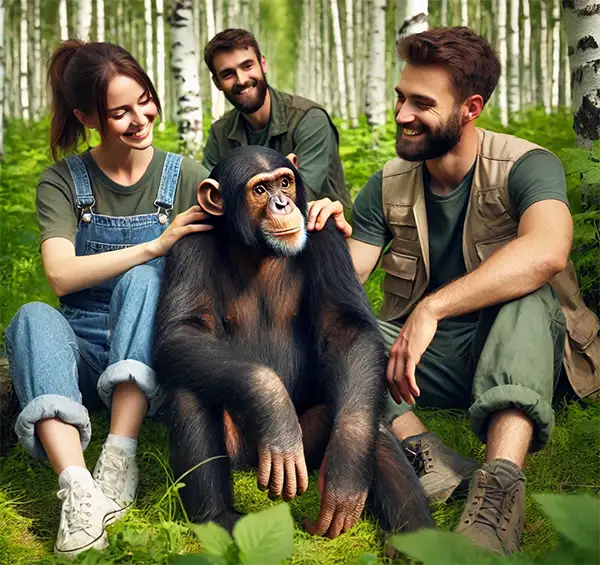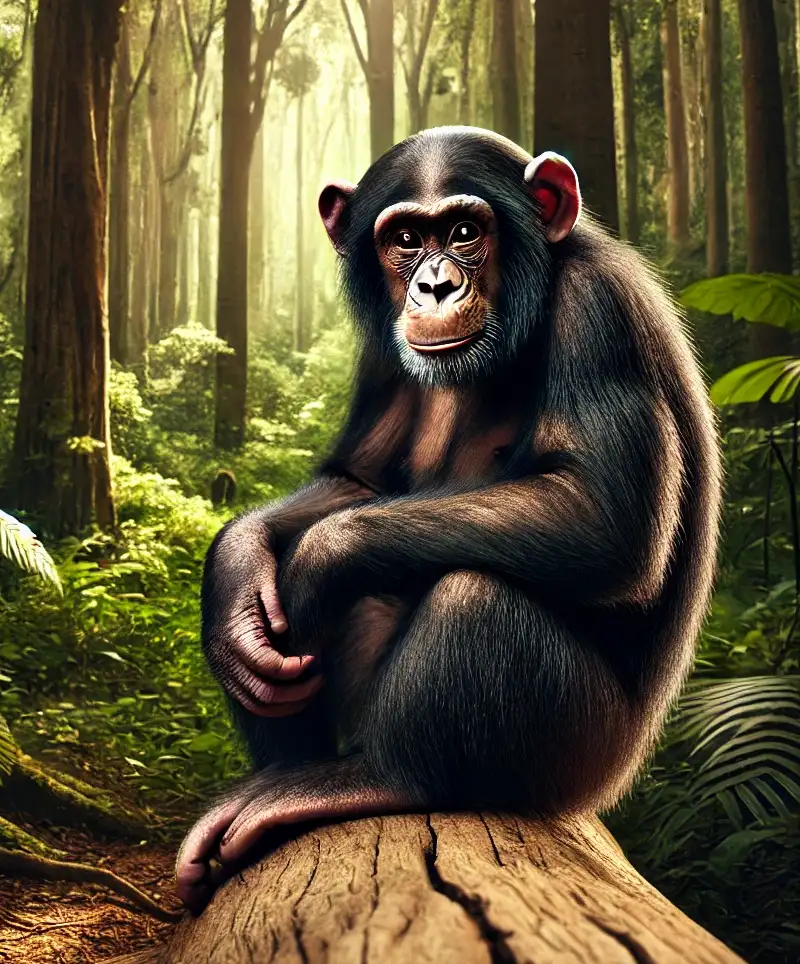Celebrating Our Closest Cousins
World Chimpanzee Day, celebrated on July 14th, honors our closest living relatives in the animal kingdom: the chimpanzees. These remarkable creatures share 98% of their DNA with humans, making them an intriguing subject for study and conservation efforts. Let's delve into the fascinating world of chimpanzees with a sprinkle of humor along the way.
A Brief History of World Chimpanzee Day
World Chimpanzee Day was established on July 14, 2018, marking a significant milestone in the global effort to recognize and protect one of our closest relatives in the animal kingdom. The date was chosen to commemorate the exact day in 1960 when the legendary primatologist Dr. Jane Goodall first set foot in what is now Gombe Stream National Park in Tanzania. Her arrival heralded the beginning of a groundbreaking journey that would transform our understanding of chimpanzees and the broader primate family.
The Pioneering Work of Dr. Jane Goodall: Dr. Goodall's journey to Gombe wasn't just a physical expedition but also an intellectual odyssey that would revolutionize the study of primates. Armed with little more than a notebook, binoculars, and an unyielding spirit of curiosity, she began her observations. At a time when the scientific community held rigid views about the separation between humans and animals, her discoveries challenged these preconceptions.
 One of Dr. Goodall's most remarkable findings was that chimpanzees use tools—a behavior previously thought to be exclusive to humans. She observed chimpanzees crafting sticks to fish termites out of mounds, a revelation that prompted the famed anthropologist Louis Leakey to remark, "Now we must redefine tool, redefine man, or accept chimpanzees as humans." This discovery was not only a scientific breakthrough but also a profound moment that blurred the lines between humans and the rest of the animal kingdom.
One of Dr. Goodall's most remarkable findings was that chimpanzees use tools—a behavior previously thought to be exclusive to humans. She observed chimpanzees crafting sticks to fish termites out of mounds, a revelation that prompted the famed anthropologist Louis Leakey to remark, "Now we must redefine tool, redefine man, or accept chimpanzees as humans." This discovery was not only a scientific breakthrough but also a profound moment that blurred the lines between humans and the rest of the animal kingdom.
The Road to Recognition: The establishment of World Chimpanzee Day was driven by the need to raise awareness about the critical issues facing chimpanzees. Habitat destruction, poaching, and disease continue to threaten their populations. By dedicating a day to these primates, conservationists aim to draw global attention to their plight and galvanize efforts to protect them.
The Jane Goodall Institute (JGI), founded by Dr. Goodall herself, played a pivotal role in initiating this day of recognition. The JGI has been at the forefront of chimpanzee conservation, promoting research, education, and advocacy. World Chimpanzee Day aligns with the institute's mission to ensure that chimpanzees can live free from the threats that jeopardize their survival.
Global Impact and Ongoing Efforts: Since its inception, World Chimpanzee Day has garnered support from numerous organizations and individuals worldwide. Events and activities are held globally to celebrate and educate people about chimpanzees. These include educational programs in schools, special exhibits in zoos, and public seminars featuring experts in primatology and conservation.
In addition to raising awareness, World Chimpanzee Day also emphasizes the importance of supporting sustainable practices that benefit both humans and chimpanzees. Efforts such as reforestation projects, anti-poaching initiatives, and community engagement programs are highlighted to showcase the multifaceted approach needed to protect these primates.
Celebrating Milestones and Looking Forward: World Chimpanzee Day not only commemorates past achievements but also sets the stage for future efforts. Each year, the day serves as a reminder of the progress made in understanding and protecting chimpanzees, while also highlighting the ongoing challenges. It encourages people to get involved, whether through volunteering, donating to conservation projects, or simply spreading the word about the importance of chimpanzee conservation.
As we celebrate World Chimpanzee Day, we honor the legacy of Dr. Jane Goodall and the countless individuals who have dedicated their lives to studying and protecting these incredible animals. Their work inspires us to continue striving for a world where chimpanzees can thrive in their natural habitats, free from the threats that currently endanger them.
By reflecting on the history and significance of World Chimpanzee Day, we are reminded of the deep connection we share with these remarkable creatures and the responsibility we hold to ensure their future. So, let’s celebrate this day with a renewed commitment to conservation and a heartfelt appreciation for our closest cousins in the animal kingdom.
Chimpanzee Facts That Will Make You Go Bananas
-
Tool Time: Chimpanzees are renowned for their tool-making skills. They use sticks to fish termites out of mounds and rocks to crack open nuts. Imagine a chimpanzee handyman—move over, Bob Vila!
-
Express Yourself: Chimpanzees have a rich repertoire of facial expressions. They can show happiness, sadness, anger, and even a cheeky grin. It's like living in a perpetual episode of a soap opera, only furrier.
-
The Social Network: Chimpanzees live in complex social groups called communities. They have intricate relationships, alliances, and yes, even drama. Who knew "Keeping Up with the Chimps" could be a reality show?
-
Communication Skills: Besides facial expressions, chimpanzees communicate using a variety of sounds and gestures. Their vocalizations include pant-hoots, screams, and grunts. It's like a jungle version of an overenthusiastic group chat.
Conservation Challenges
While it's fun to marvel at chimpanzee antics, it's crucial to recognize the serious threats they face. Habitat loss, poaching, and disease are significant challenges that jeopardize their survival. World Chimpanzee Day serves as a reminder that these intelligent beings need our help to thrive.
-
Habitat Destruction: Deforestation for agriculture and logging is destroying the forests that chimpanzees call home. Imagine your favorite hangout spot being bulldozed to make way for a parking lot—outrageous!
-
Poaching and Illegal Trade: Chimpanzees are hunted for bushmeat, and infants are often captured for the illegal pet trade. Picture a chimpanzee as a house pet—cute but utterly impractical.
-
Disease: Chimpanzees are susceptible to many of the same diseases as humans, including Ebola and respiratory infections. It’s like catching a cold from your cousin—annoying and inconvenient.
How to Celebrate World Chimpanzee Day
-
Learn and Educate: Read about chimpanzees and share their stories with others. Knowledge is power, and the more people know, the better we can protect these incredible animals.
-
Support Conservation Efforts: Donate to organizations working to protect chimpanzees and their habitats. Every little bit helps, and it’s a great way to show you care.
-
Visit a Sanctuary or Zoo: If possible, visit a reputable sanctuary or zoo to see chimpanzees up close. Just remember, no selfies with the chimps—let’s keep their privacy intact.
-
Spread the Word: Use social media to raise awareness about World Chimpanzee Day. Share facts, videos, and photos to inspire others to join the cause. #WorldChimpanzeeDay
Fun Ways to Celebrate with a Smile
-
Chimpanzee Impressions: Gather your friends and have a chimpanzee impression contest. Who can do the best pant-hoot or termite-fishing mimic? Bonus points for creativity!
-
Banana Feast: Host a banana-themed party with banana splits, banana bread, and banana smoothies. Just don’t go overboard and start swinging from the chandeliers.
-
Movie Marathon: Watch documentaries and movies featuring chimpanzees. From "Jane" to "Planet of the Apes," there’s plenty of chimp-centric entertainment to enjoy.
World Chimpanzee Day is a fantastic opportunity to celebrate our remarkable cousins while recognizing the need to protect them. By combining education, conservation efforts, and a dash of humor, we can ensure that these amazing creatures continue to thrive in the wild.
So, let’s raise a banana in salute to our chimpanzee friends and commit to making a positive impact on their future. After all, with 98% shared DNA, it’s the least we can do for family!
Please Share our Content






 One of Dr. Goodall's most remarkable findings was that chimpanzees use tools—a behavior previously thought to be exclusive to humans. She observed chimpanzees crafting sticks to fish termites out of mounds, a revelation that prompted the famed anthropologist Louis Leakey to remark, "Now we must redefine tool, redefine man, or accept chimpanzees as humans." This discovery was not only a scientific breakthrough but also a profound moment that blurred the lines between humans and the rest of the animal kingdom.
One of Dr. Goodall's most remarkable findings was that chimpanzees use tools—a behavior previously thought to be exclusive to humans. She observed chimpanzees crafting sticks to fish termites out of mounds, a revelation that prompted the famed anthropologist Louis Leakey to remark, "Now we must redefine tool, redefine man, or accept chimpanzees as humans." This discovery was not only a scientific breakthrough but also a profound moment that blurred the lines between humans and the rest of the animal kingdom.








 "Sláinte!" is a traditional Irish expression used as a toast, equivalent to "Cheers!" in English.
"Sláinte!" is a traditional Irish expression used as a toast, equivalent to "Cheers!" in English.